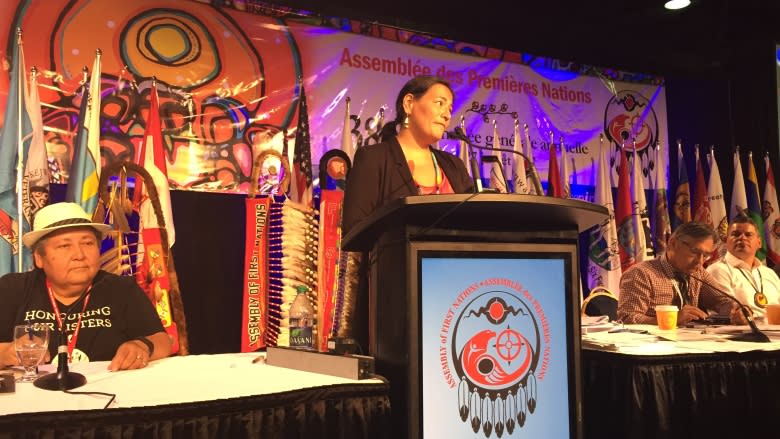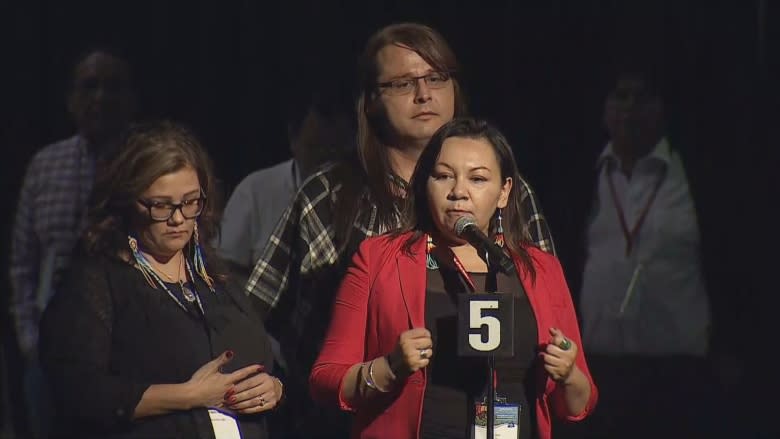First Nations leaders reject call for MMIWG commissioners to step down
First Nations leaders have voted against a proposal put forward by Manitoba chiefs calling for resignations at the beleaguered National Inquiry into Missing and Murdered Indigenous Women and Girls.
Instead, chiefs at the Assembly of First Nations annual meeting in Regina have passed a separate resolution calling on the organization's leadership to demand big changes at the inquiry.
That resolution, introduced by chiefs from Ontario and Quebec, does not ask for any of the commissioners to be replaced.
The two resolutions were introduced — and vigorously debated — about the inquiry at this week's AFN assembly, which concluded Thursday.
The other resolution, introduced by newly elected Grand Chief Arlen Dumas of the Assembly of Manitoba Chiefs, also called for changes, but would also have required the AFN to ask Prime Minister Justin Trudeau to replace the inquiry's four commissioners.
Chiefs voted that one down.
"I appreciate the comments of people who spoke on the earlier resolution," Dumas said. "But when it comes to the commissioners, I cannot speak positively."
Dumas said that if he conducted himself the way the commissioners have, without communicating to people, he wouldn't be re-elected.
Other chiefs spoke against the motion, citing concerns about derailing the entire inquiry process — one that families have long fought for.
Call for unity
Kevin Hart, the AFN's Manitoba regional chief, called for unity on the issue of missing and murdered Indigenous women and girls.
"This is bigger than all of us, and we have to be united more than ever. We're not united. We're fighting right now," he said.
"The media's watching us, social media's watching us. The government of Canada and the provinces are watching us right now," Hart said. "Please, everybody, let's look in our hearts here. Why are we politicizing such an important subject right now, when we should be embracing one another and working together?"
Hours before the vote, lead commissioner Marion Buller told CBC's Power & Politics that she and her fellow commissioners would not resign, regardless of the vote's outcome.
"We're not stepping down. Simple as that," she said. "We have work to do, we have very important work to do, and we intend to do it."
Before delegates voted, the resolution was amended so it called on AFN leadership to inform the government that "it is the position of the Manitoba chiefs that the current MMIWG national inquiry commissioners must be replaced with new commissioners, who will respect MMIWG families and survivors, be trauma-informed and put families first."
Families need more input, say chiefs
Ontario and Quebec's resolution, introduced by Serpent River, Ont., Chief Elaine Johnston, asked for the inquiry to be more transparent and make sure its public hearing process is less "legalistic."
Families need to have more input into how it operates, the resolution said.
It also calls on government to provide more funding and resources to the commission so it can better carry out its mandate — which should also be extended beyond its current two years.
The two resolutions came after an emotional, hours-long session with two commissioners, Michèle Audette and Brian Eyolfson, at the AFN meetings on Wednesday evening, when several families and community leaders asked for the process to be redesigned.
"It's a process that's re-victimizing families, and I think we need a hard reset," said Sheila North-Wilson, grand chief of Manitoba Keewatinowi Okimakanak, which represent 30 First Nations in northern Manitoba.
"I'm endorsing the resolution that's coming from our region for a hard reset and a regional process and a call for the resignation of the commissioners."
Police conduct and cold cases
Families and other critics have increasingly accused the commission of being out of touch and not doing enough to communicate their work.
There's also frustration because they believe the commission will not hold police accountable for misconduct or have the ability to re-open cold cases.
However, the commission released a statement on Thursday that it "can and will consider the conduct of policing services in 14 federal, provincial and territorial jurisdictions in Canada."
"However, there are differences in the powers of the national inquiry to consider police conduct for example; in British Columbia, the commissioners cannot make findings of misconduct. In all jurisdictions the national inquiry can refer information on specific cases back to authorities for reinvestigation," the statement reads.
The commission also said that it currently has a forensic team reviewing police files.










